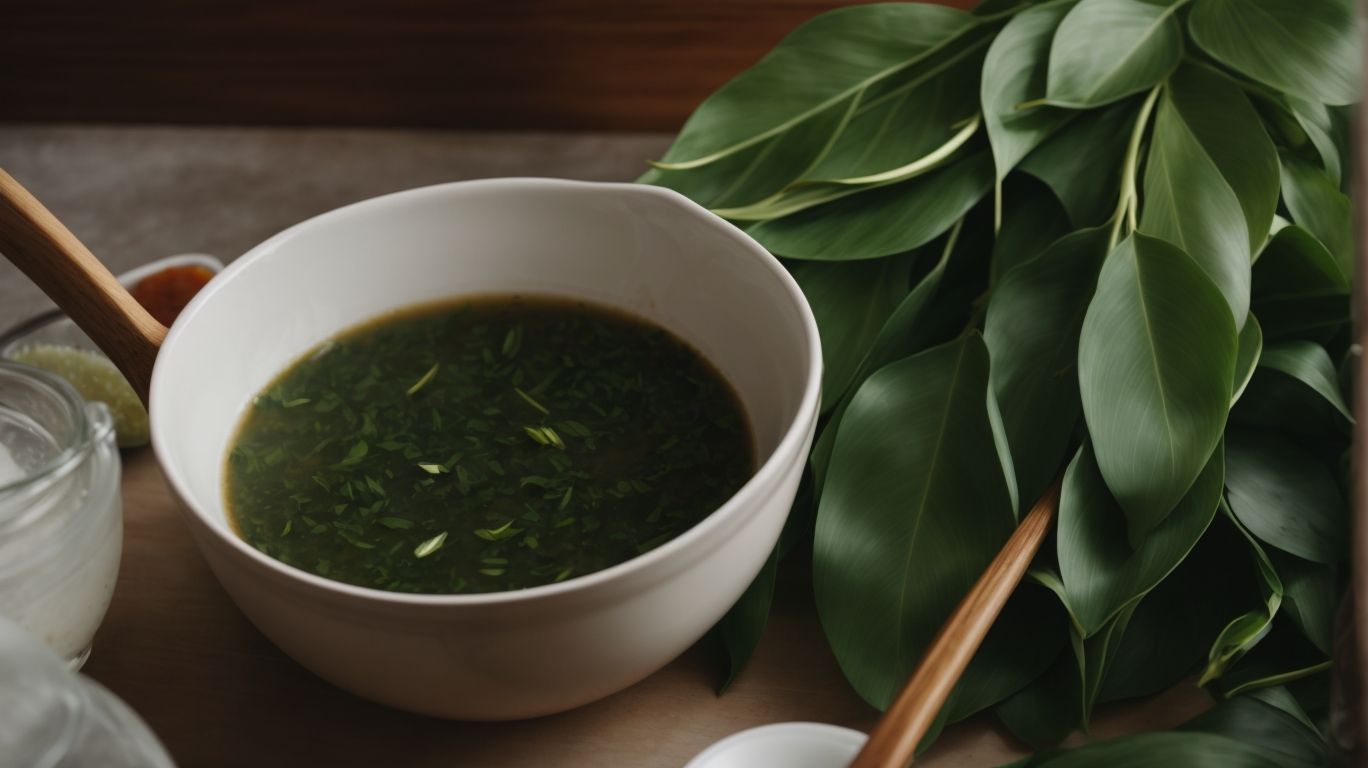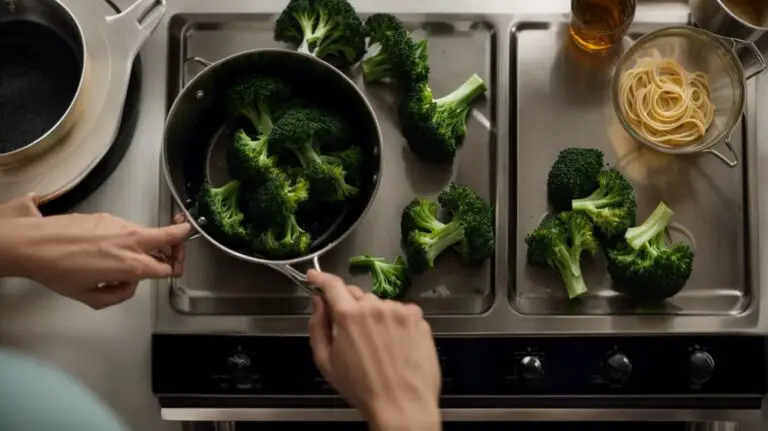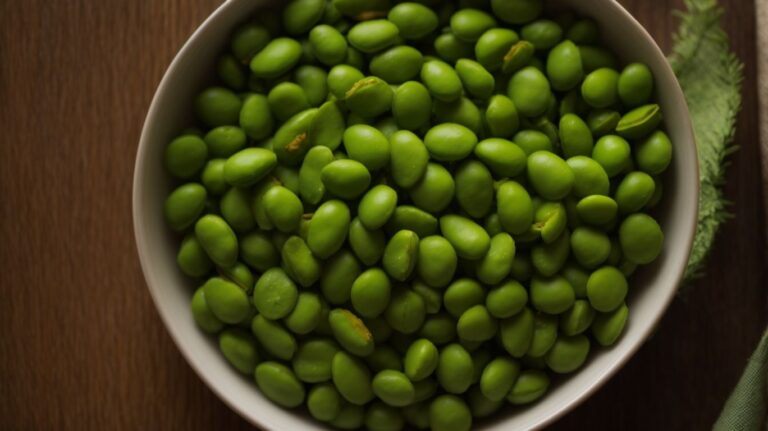How to Cook Ewedu Without Potash?
Have you ever wondered what exactly Ewedu is and why some people choose to cook it without potash?
In this article, we will explore the health benefits of cooking Ewedu without potash, as well as how to avoid potential harmful effects.
We will also discuss the ingredients needed for this dish and provide a step-by-step guide on how to prepare it.
Whether you prefer a traditional Nigerian style or a modern twist, we have tips and tricks to help you perfect your Ewedu recipe.
Stay tuned to learn more about this delicious and nutritious dish!
Key Takeaways:
What is Ewedu?
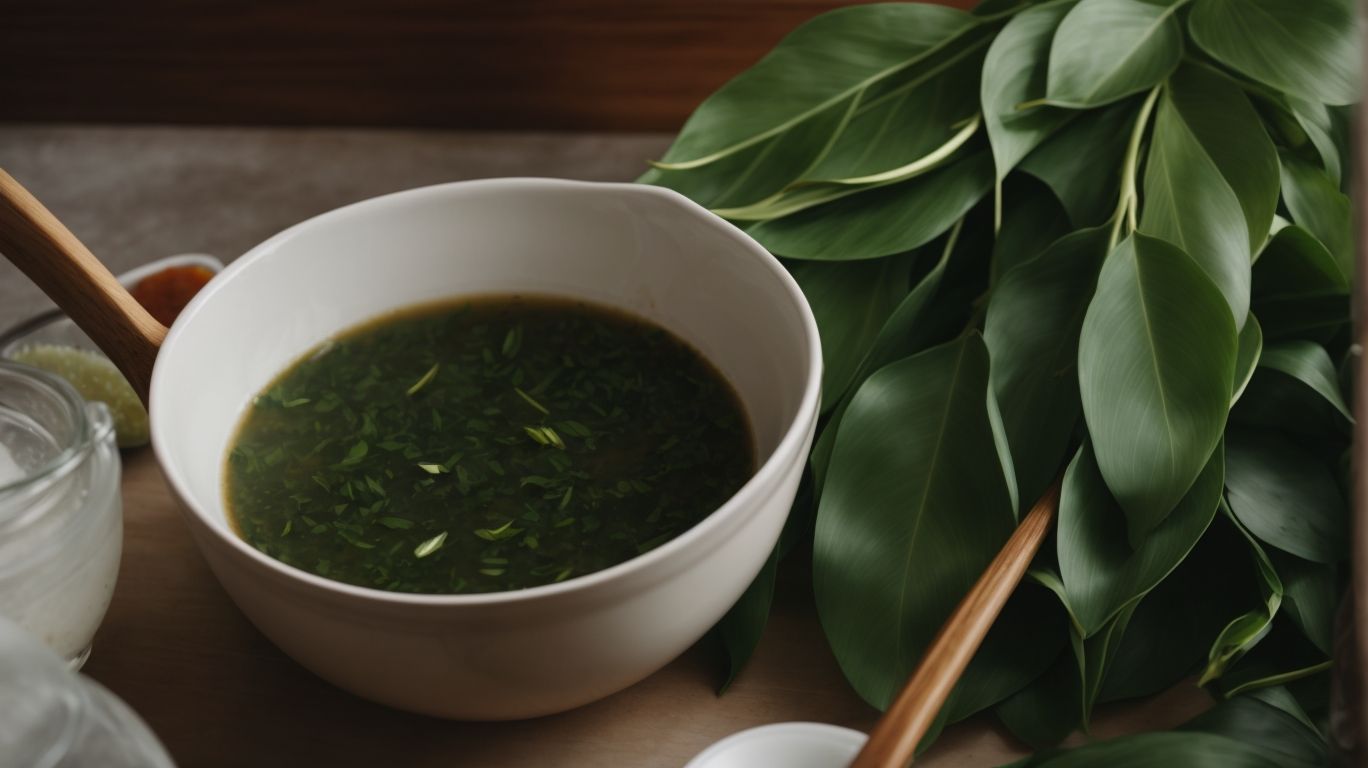
Credits: Poormet.Com – Larry Brown
Ewedu is a traditional Nigerian soup made from the leaves of the Jute plant, commonly found in West Africa.
Originating from the Yoruba ethnic group in Nigeria, Ewedu soup holds a significant place in Nigerian cuisine. It is often served with Fufu or Amala, traditional starchy staples. This green, viscous soup is not only delicious but also carries cultural importance, being a dish served at special occasions like weddings and festivals. The unique flavor of Ewedu comes from the combination of the jute leaves’ earthy taste and the seasoning used during preparation.
Why Cook Ewedu Without Potash?
Cooking Ewedu without potash is a healthier alternative that retains the natural flavors and nutrients of the dish.
When Ewedu is prepared without potash, it eliminates the need for the alkali substance that is typically used to soften the leaves. Potash, while aiding in the cooking process, can also have adverse effects on health due to its high alkaline content. By skipping this ingredient, you can enjoy a purer and more nutritious version of the dish. Cooking Ewedu without potash allows the flavors of the vegetable to shine through, offering a fresher and more authentic taste that is not masked by the potash’s influence.
Health Benefits of Cooking Ewedu Without Potash
Cooking Ewedu without potash preserves more nutrients and reduces the risk of potential health hazards associated with chemical additives.
Ewedu, commonly known as jute leaf, is a highly nutritious leafy green vegetable that is popular in Nigerian cuisine. When prepared without potash, it retains its vibrant green color, fresh flavor, and crucial nutrients such as vitamins A, C, and K, as well as iron and calcium. By avoiding potash, which can contribute to high sodium levels, one can enjoy a more natural and wholesome dish. This traditional way of cooking Ewedu not only enhances its taste but also contributes to a balanced diet, promoting overall health and well-being.
Avoiding Potential Harmful Effects of Potash
Eliminating potash from Ewedu preparation helps in avoiding potential risks of consuming excessive chemicals and maintains the authentic taste of the dish.
Using natural alternatives like kanwu instead of potash in Ewedu soup is not only beneficial for your health but also enhances the overall flavor profile of the dish. Potash, although traditionally used in certain Nigerian cuisines for its alkaline properties, can have negative effects on the digestive system when consumed in excess.
Kanwu, on the other hand, is a natural ingredient that offers similar thickening properties without the harmful side effects of potash. It helps to maintain the nutritional value of the dish while imparting a subtle earthy flavor that complements the inherent taste of the Ewedu leaves.
What Are the Ingredients for Cooking Ewedu Without Potash?
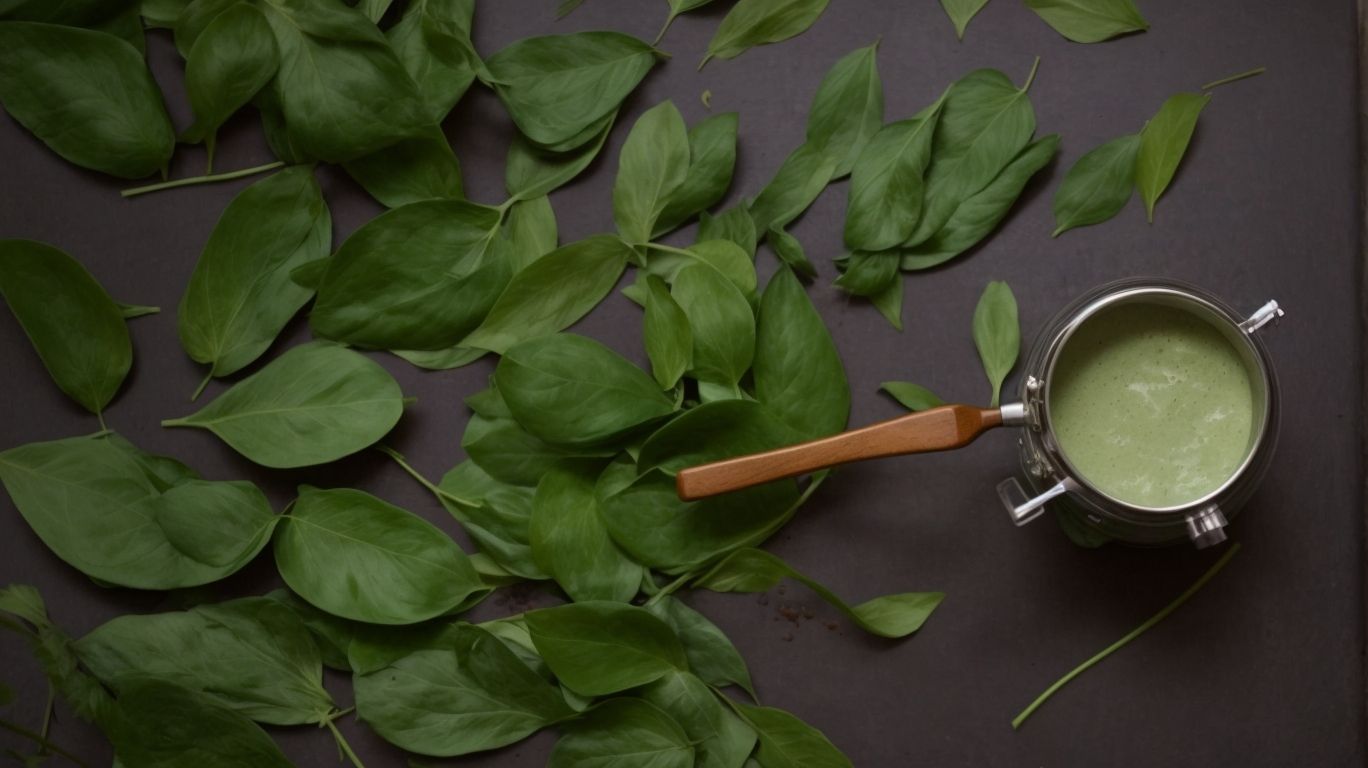
Credits: Poormet.Com – Kevin Harris
The essential ingredients for making Ewedu without potash include fresh Jute leaves or a frozen pack, along with traditional seasonings like locust bean and crayfish.
When preparing Ewedu without potash, one should also have water and salt on hand to ensure the dish is properly seasoned. The use of fresh Jute leaves provides a vibrant and earthy flavor, while opting for a frozen pack can offer convenience without compromising on taste. Indigenous flavors such as iru (locust beans) and ground crayfish are crucial elements that give Ewedu its distinct taste and aroma. These traditional seasonings add depth and richness to the dish, enhancing its overall appeal.
Step-by-Step Guide to Cooking Ewedu Without Potash
Follow this detailed guide to cook Ewedu without potash, ensuring a flavorful and nutritious dish that stays true to its Nigerian roots.
Begin by thoroughly rinsing the fresh Ewedu leaves and removing any damaged or discolored parts.
Next, finely chop the leaves and set them aside while you prepare the rest of the ingredients.
In a pot, heat some oil over medium heat, adding finely chopped onions and peppers for extra flavor.
Once the onions are translucent, add the chopped Ewedu leaves and allow them to wilt slightly.
Gradually pour in a small amount of water, just enough to cover the leaves.
Cover the pot and let the Ewedu simmer until it reaches your desired consistency.
Add salt and seasonings to taste, stir well, and let it simmer a little longer before serving.
This simple cooking process brings out the natural flavors of the Ewedu leaves, creating a delicious and wholesome dish that pairs perfectly with staple Nigerian meals like pounded yam or rice.
Preparing the Ewedu Leaves
Before cooking Ewedu, ensure to properly clean and prepare the Jute leaves, whether using fresh leaves sourced locally or a convenient frozen pack.
For fresh jute leaves, start by sorting through them, discarding any discolored or wilted leaves. Then, gently wash the leaves under running water to remove any dirt or impurities. Next, fill a bowl with water and soak the leaves for a few minutes to loosen any remaining debris. Drain the water and rinse the leaves one more time.
When using frozen jute leaves, make sure to thaw them in the refrigerator overnight or in a bowl of lukewarm water. Once defrosted, follow the same cleaning process as you would with fresh leaves to ensure optimal taste and texture.
Boiling the Ewedu Leaves
Boiling the Ewedu leaves to achieve the desired viscosity is a crucial step in creating the perfect texture for this traditional Nigerian soup.
When boiling Ewedu leaves, it is essential to monitor the process closely to prevent overcooking, which can result in a slimy consistency. To achieve the desired thickness, simmer the leaves gently after the initial boil, allowing the natural starches to release and thicken the mixture. Adding a small amount of potash or baking soda can help expedite this process, but it should be done with caution to avoid altering the flavor.
Visual cues play a crucial role in determining readiness; when the mixture darkens slightly and gains a smooth, gel-like texture, it’s a sign that the Ewedu leaves are cooked to perfection.
Blending the Ewedu Leaves
Blending the boiled Ewedu leaves to a smooth consistency enhances the overall texture and flavor of the soup before adding the remaining ingredients.
For a seamless blending process, a high-powered blender or food processor is recommended to ensure the leaves are finely pureed without any fibrous texture.
This step not only contributes to the soup’s smoothness but also helps release the natural thickeners in the Ewedu leaves, adding a unique viscosity to the dish.
By achieving a velvety consistency through blending, the Ewedu soup becomes more visually appealing and enjoyable to consume, elevating the dining experience for those partaking in this traditional Nigerian delicacy.
Adding the Ingredients
Incorporate traditional seasonings like locust bean, crayfish, and a hint of chicken bouillon powder to enhance the flavor profile of the Ewedu soup while adjusting salt to taste.
When preparing Ewedu soup, the addition of locust bean, also known as iru, infuses a deep umami flavor that is characteristic of many African dishes. The crayfish, when ground into a fine powder, provides a rich and earthy taste, complementing the natural bitterness of the Ewedu leaves.
The chicken bouillon powder serves as a flavor enhancer, offering a savory depth to the soup. Be cautious with the salt as it plays a crucial role in harmonizing the diverse flavors; adding it gradually allows for fine-tuning and achieving the perfect balance.
Cooking the Ewedu Mixture
Cook the seasoned Ewedu mixture until it reaches the desired consistency, ready to be served alongside popular Nigerian staples like Amala, Eba, or garri.
Traditionally, Ewedu soup is often cooked until it achieves a slightly viscous texture, ideal for coating the accompanying fufu or Swallow. To achieve this, simmer the mixture over low heat, stirring occasionally to prevent burning and ensure even cooking.
For a more traditional touch, consider serving the Ewedu soup with assorted meat like beef, goat meat, or fish. The addition of smoked fish can impart a rich, smoky flavor to the soup, enhancing its overall taste.
To perfect the texture of the Ewedu soup, you can use a blender to puree the cooked mixture before simmering, resulting in a smooth and velvety consistency. Remember to adjust the seasoning, adding salt and spices to taste for a well-balanced flavor profile.
How to Serve Ewedu Without Potash?
Serve Ewedu without potash in traditional Nigerian style, paired with protein-rich dishes like beef stew or fish stew for a complete and satisfying meal.
When serving Ewedu soup traditionally, it is common to pair it with staples like amala, eba, or pounded yam, adding a perfect balance of textures and flavors. The thick and slimy texture of the Ewedu soup contrasts wonderfully with the softness of the pounded yam or the grainy consistency of eba, creating a delightful dining experience.
To further elevate the nutritional content of the meal, consider adding protein accompaniments like grilled chicken or goat meat. These options not only enhance the flavors of the dish but also provide essential proteins for a well-rounded and nourishing meal.
Popular side dishes such as fried plantains or steamed rice can complement the rich flavors of the Ewedu soup remarkably well. The sweetness of the plantains or the simplicity of steamed rice can add a delightful contrast that enhances the overall dining experience.
Traditional Nigerian Style
In the traditional Nigerian style, Ewedu is served with locally made staples like pounded yam or fufu, offering a hands-on dining experience that celebrates the country’s culinary heritage.
Ewedu soup is often enjoyed in a communal setting, symbolizing unity and togetherness within Nigerian culture. It is common for family members or friends to sit together around a shared bowl, tearing off pieces of the pounded yam or fufu and dipping it into the flavorful soup.
This interactive way of eating fosters a sense of closeness and camaraderie, encouraging conversations and bonding over the meal. The act of tearing and dipping creates a tactile experience that enhances the flavors and textures of the dish, adding to the overall enjoyment.
Pairing Ewedu with these specific accompaniments not only complements the soup’s earthy and slightly slimy taste but also provides a satisfying and fulfilling meal that is both nourishing and culturally rich.
Modern Twist
For a modern twist, consider incorporating innovative elements like baking soda to experiment with the texture and presentation of Ewedu soup, offering a fresh take on this classic dish.
By infusing a pinch of baking soda into the mixture, you can achieve a light and frothy consistency that adds a unique appeal to the traditional soup. Another creative approach could be to bake Ewedu leaves with a light dusting of baking soda to create crispy, flavorful chips as a delightful snack or garnish. Embrace the versatility of Ewedu soup by blending it into smoothies or using it as a base for a nutritious salad dressing, opening up a world of exciting culinary possibilities.
Tips and Tricks for Cooking Ewedu Without Potash
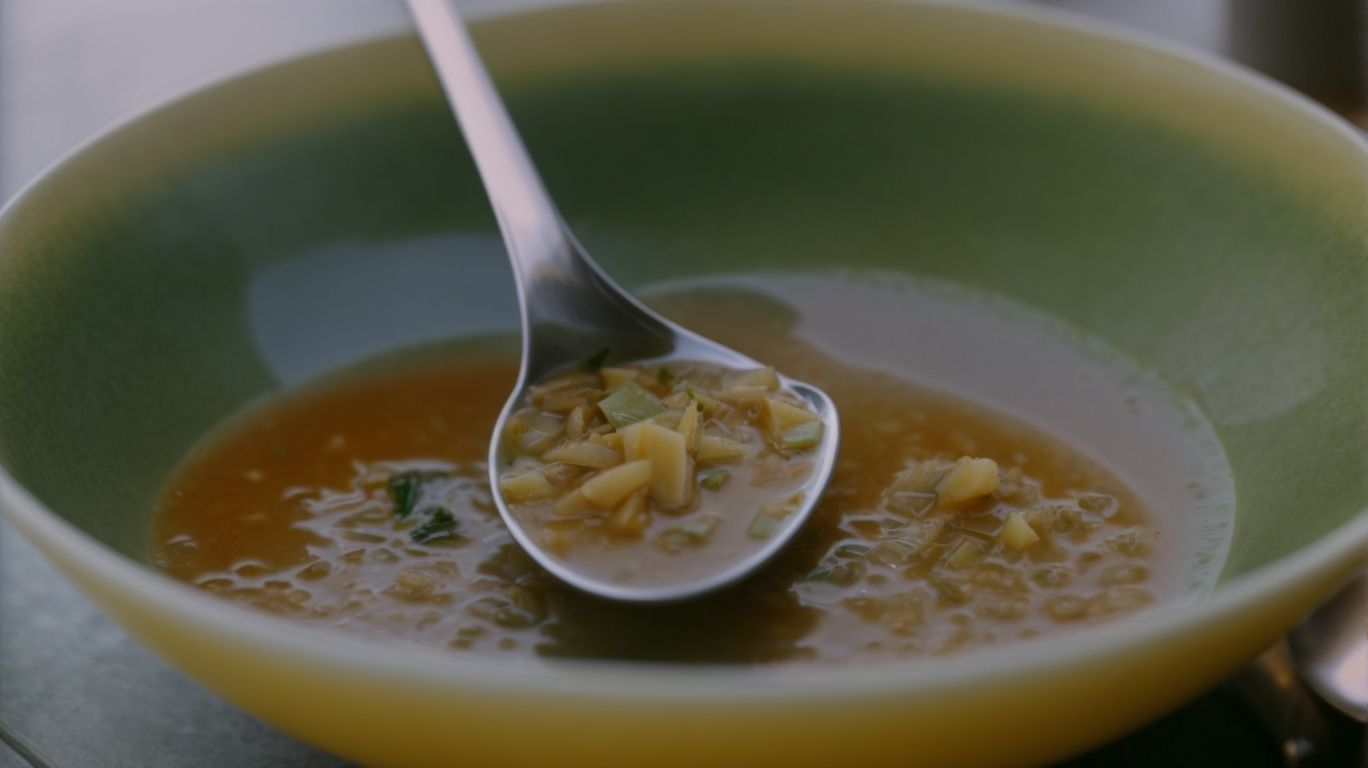
Credits: Poormet.Com – Jonathan Scott
Enhance the flavors of Ewedu by incorporating ingredients like Olive Oil, Onion, Sumac, and a splash of lemon juice, adding a refreshing twist to this beloved Nigerian dish.
If you’re looking to prepare Ewedu without potash, you can opt for alternatives such as baking soda or vinegar to achieve similar textural results. To further elevate the taste profile, consider adding a sprinkle of crushed red pepper flakes for a hint of heat, or a touch of garlic for extra depth. Experiment with different herbs like parsley, cilantro, or mint to tailor the recipe to your liking. For a creamier consistency, blend some cooked yams or potatoes into the Ewedu mixture before serving.
Conclusion
Cooking Ewedu without potash preserves the authentic flavors and nutritional benefits of this beloved Nigerian soup, offering a healthier and delicious alternative that celebrates the country’s culinary heritage.
This traditional method of cooking Ewedu without potash involves thorough washing and meticulous preparation of the vegetable to ensure a clean and pure taste. By avoiding the use of potash, the natural flavors of the Ewedu leaves shine through, providing a more wholesome and nourishing dish. This approach not only enhances the health benefits by retaining essential nutrients but also maintains the cultural integrity of the recipe, safeguarding the rich culinary history of Nigeria.
Frequently Asked Questions
What is Ewedu and why is potash typically used when cooking it?
Ewedu is a popular leafy green vegetable commonly used in Nigerian cuisine. Potash is often added to Ewedu dishes because it helps soften the leaves and gives the soup a slimy consistency that is highly desired.
Can I still achieve the slimy consistency without using potash?
Yes, there are alternative methods to achieve the slimy consistency without using potash. One method is to use baking soda to help soften the leaves. Another is to cook the Ewedu with vegetables that naturally have a slimy texture, such as okra.
What can I use instead of potash in my Ewedu soup?
Aside from baking soda and okra, you can also use dried crayfish or iru (fermented locust beans) as a substitute for potash. These ingredients will not only help achieve the desired consistency, but also add a unique flavor to your dish.
Will using a different ingredient instead of potash change the taste of my Ewedu soup?
Yes, using different ingredients may slightly alter the taste of your Ewedu soup. However, it will still be delicious and have the same slimy texture. You can also experiment with different ingredients to customize the flavor to your liking.
How much potash should I use when cooking Ewedu?
The amount of potash used in cooking Ewedu varies depending on personal preference and the quantity of the soup being made. It is recommended to start with a small amount and gradually add more if needed, as too much potash can make the soup too slimy.
Are there any health concerns with using potash in cooking?
While potash is commonly used in Nigerian cuisine, there are some health concerns associated with its use. It is recommended to limit the amount of potash used in cooking and to use alternative methods if possible. Consult with a healthcare professional for any specific concerns.

